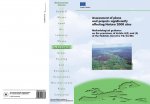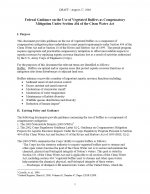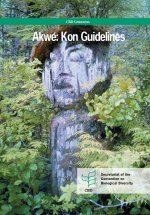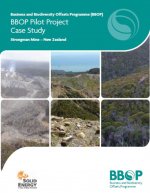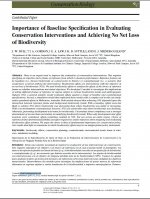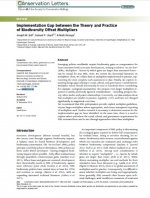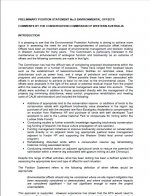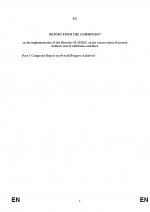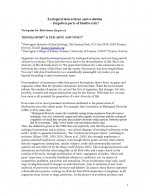Assessment of Plans and Projects Significantly Affecting NATURA 2000 Sites
European UnionThis document has been produced to provide nonmandatory methodological help to carry out or review the assessments required under Article 6(3) and (4) of the habitats directive (1) (referred to here as the Article 6 assessments). These assessments are required where a project or plan may give rise to significant effects upon a Natura 2000 […]
Federal Guidance on the Use of Vegetated Buffers as Compensatory Mitigation Under Section 404 of the Clean Water Act
Government of the United StatesThis document provides guidance on the use of vegetated buffers as a component of compensatory mitigation plans undertaken to meet permit requirements under Section 404 of the Clean Water Act and/or Section 10 of the Rivers and Harbors Act of 1899. The permit program requires appropriate and practicable compensatory mitigation to offset unavoidable impacts to […]
Akwé Kon Voluntary Guidelines
Secretariat of the Convention on Biological DiversityThe Akwé: Kon Voluntary Guidelines for the Conduct of Cultural, Environmental and Social Impact Assessments Regarding Developments Proposed to Take Place on, or which are Likely to Impact on, Sacred Sites and on Lands and Waters Traditionally Occupied or Used by Indigenous and Local Communities were developed pursuant to task 9 of the programme of […]
Solid Energy New Zealand Biodiversity Offset Case Study – 2009
Case study of Solid Energy New Zealand BBOP pilot biodiversity offset at the Strongman coal mine, South Island, New Zealand. Published in 2009.
Importance of Baseline Specification in Evaluating Conservation Interventions and Achieving No Net Loss of Biodiversity
Joseph W. Bull, A Gordon, E. A. Law, K.B. Suttle, E. J. Milner-Gulland - Department of Life Sciences, Imperial College London, School of Global, Urban and Social Studies, RMIT University, Melbourne, Environmental Decisions Group, School of Biological Sciences, University of Queensland, Brisbane, Department of Life Sciences & Grantham Institute for Climate Change, Imperial College London, Department of Life Sciences, Imperial College LondonThere is an urgent need to improve the evaluation of conservation interventions. This requires specifying an objective and a frame of reference from which to measure performance. Reference frames can be baselines (i.e., known biodiversity at a fixed point in history) or counterfactuals (i.e., a scenario that would have occurred without the intervention). Biodiversity offsets […]
Implementation Gap between the Theory and Practice of Biodiversity Offset Multipliers
Joseph W. Bull, Samuel P. Lloyd, Niels Strange - Department of Food and Resource Economics & Center for Macroecology, Evolution and Climate, University of Copenhagen, Department of Zoology, University of Oxford, Department of Food and Resource Economics & Center for Macroecology, Evolution and Climate, University of CopenhagenEmerging policies worldwide require biodiversity gains as compensation for losses associated with economic development, seeking to achieve no net loss (NNL). Multipliers factors by which gains are larger than associated losses can be crucial for true NNL. Here, we review the theoretical literature on multipliers. Then, we collate data on multipliers implemented in […]
Business and Biodiversity: Offsetting the impact on biodiversity
CREMThe discussion paper under review with respect to biodiversity offsets is one of the documents constituting the output of the project Business and Biodiversity in developing countries higher on the agenda of Dutch companies quoted on the stock exchange: identification of concepts and strategies of the Dutch Association of Investors for Sustainable Development (VBDO).
Preliminary Position Statement No 9 Environmental Offsets: Comments by the Conservation Commission of Western Australia
Government of AustraliaIt is pleasing to see that the Environmental Protection Authority is aiming to achieve more rigour in assessing the need for and the appropriateness of particular offset initiatives. Offsets have been an important aspect of environmental management and decision making in Western Australia for many years. The Commission is particularly interested in the maintenance or […]
Report from the Commission on the Implementation of the Directive 92/43/EEC on the Conservation of Natural Habitats and of Wild Fauna and Flora Composite Report on Overall Progress Achieved
European UnionBiological diversity, essential for the maintenance of life on Earth, is being lost on a global level at a rate higher than at any other time in the past, according to the UNEPs Global Biodiversity Assessment. The same document states that in some EU Member States up to 24% of the species of certain groups […]
Ecological Interactions and Evolution: Forgotten Parts of Biodiversity
Thomas Bohn, Per-Arne AmundsenOrganisms are shaped contemporaneously by ecological processes and over long periods of time by evolution. These activities have lead to the diversification of life. But is the diversity of life all biodiversity is? We argue that biodiversity is the conclusion drawn both from the variety of life forms and the variety of processes that have […]


